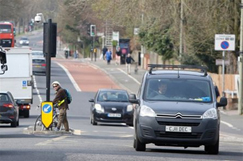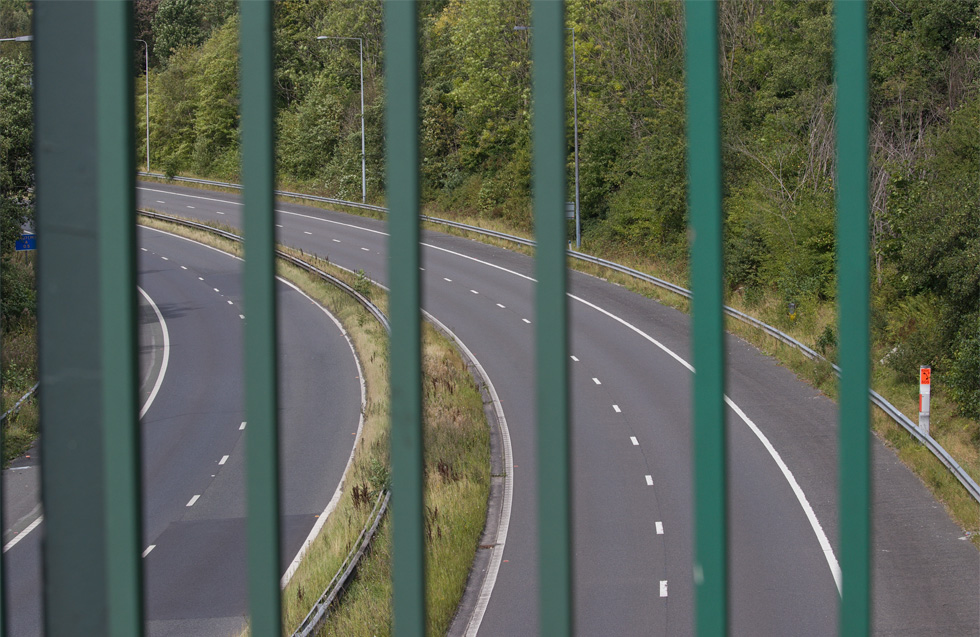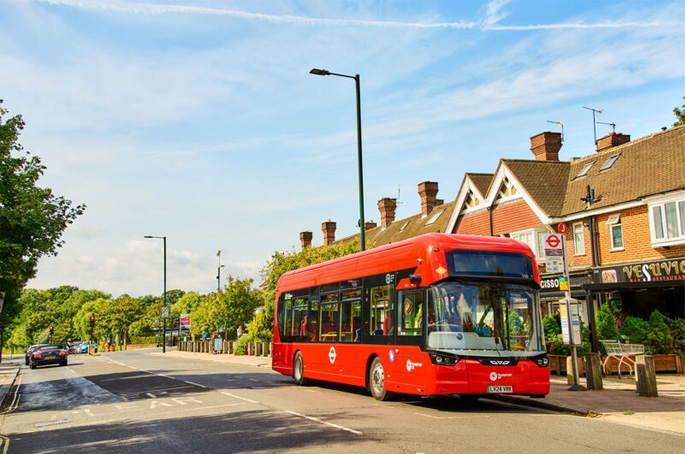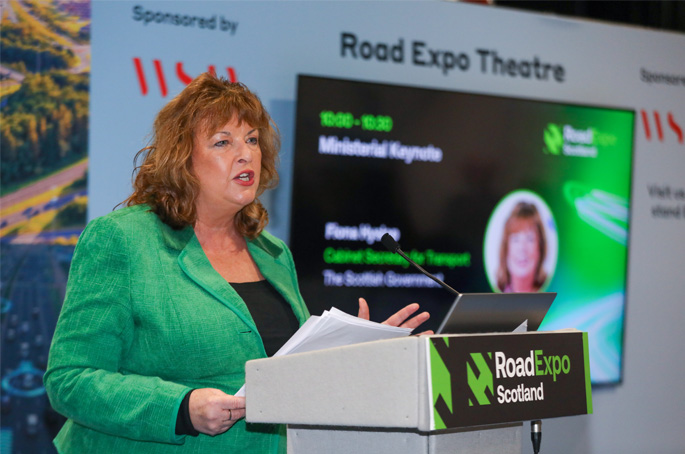Highway engineers, planners and politicians trying to tackle car dependency and promote sustainable travel are meeting fierce opposition not just from residents who feel their rights are being infringed but groups linking transport issues to a wider, more sinister, agenda.
In February approximately 2,000 people took part in demonstrations against Oxford's low traffic neighbourhoods…or perhaps the trial of traffic filters in the city… or perhaps the city council's plan to develop '15 minute neighbourhoods'.
They included local people but also many from outside the city who have over the past two or three years campaigned against many aspects of the Government's approach to COVID-19, as well as extreme far-right groups.
While the 15-minute city (or 20-minute neighbourhood, or any combination of the two) is a planning concept that seeks to provide amenities within walking distance (Barcelona is cited as an example), some claim that they are a form of ‘climate lockdown' being pursued by globalists.
While such claims appear fanciful and are often written off as 'conspiracy theories', the concept has been linked by both opponents and proponents to policies that do not just reduce the need to travel by car but limit people's freedom to do so. This follows two years of actual ‘lockdowns', so perhaps it is not surprising cynicism hangs in the air.
Ironically, controversy over the issue in Oxford followed a smoothing of relations between highway authority Oxfordshire County Council and planning authority Oxford City Council. Three years ago, they said they would consider a joint plan to tackle congestion in the city and shift people from cars to sustainable transport modes, which might include both a workplace parking levy and ‘bus gates'.
Last year, the two councils put forward a plan to trial traffic filters that restrict private cars from using some routes into the city centre and some cross-city routes.
Subject to exemptions and permits, offending drivers will get a £70 fine. Enforcement will be via cameras using automatic number plate recognition, raising concerns about surveillance.
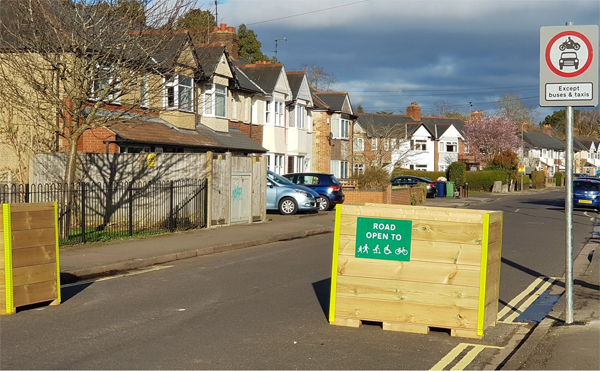
LTNs, which prevent residential streets being used by through traffic, have already been implemented in Oxford (above). For the most part, the same groups in the city either support or oppose both policies. Separately, the city council is pursuing 15-minute neighbourhoods.
In December, the two councils issued a joint statement after staff and councillors were said to have been subject to abuse ‘due to inaccurate information, being circulated online, about traffic filters'.
They said: ‘The misinformation online has linked the traffic filters to the 15-minute neighbourhoods proposal in the city council's Local Plan 2040, suggesting that the traffic filters will be used to confine people to their local area. This is not true.'
The suggestion of ‘confinement' may be catastrophising, but there is a connection between traffic restrictions and 15-minute cities or 20-minute neighbourhoods. As Richard Parnham of anti-LTN group Reconnecting Oxford points out, the county council's own Central Oxfordshire Travel Plan, which contains many restrictions on private cars, refers to ‘a travel hierarchy prioritising sustainable travel and promoting 20-minute neighbourhoods'.
In fact, in an article supporting the move, Professor Ian Loader of Oxford University wrote: ‘The 15-minute city idea underpins Oxford's current – and controversial – plans to cut traffic congestion. In addition to implementing several Low Traffic Neighbourhoods, Oxfordshire City Council plans from 2024 to trial six traffic filters which aim to reduce traffic in Oxford by 20 per cent.'
Prof Loader suggested that, far from being an absolute, the freedom to drive is in fact a hyper-regulated permission to operate dangerous machinery, 'conditional on drivers continuing to demonstrate they can do so safely, with proper attention to the needs of others'.
'This ??????????Oxford? pic.twitter.com/8FGPxuHXsr'
— Mark (@markmaycot) March 27, 2023
Oxfordshire Liveable Streets backs LTNs and filters. Director Danny Yee says: ‘Oxford needs to do something; it has terrible congestion. Despite being a cycling city, there's huge barriers to most people cycling in a lot of places.'
He says the link in peoples' minds between 15-minute neighbourhoods and traffic filters is understandable because both are about how people move around, but filters should be seen as enabling mobility by facilitating faster bus services and new routes and safer cycling. ‘It's very hard to explain that to people whose only way of getting around is driving,' he adds.
Cynical strategies?
Adding to suspicions that proponents of the filters are not being transparent, when Oxfordshire consulted on them last autumn, it only published a summary of traffic modelling, releasing the full report after the consultation closed.
It has not given Highways an explanation as to why it did this but says the consultation and decision-making process were 'sound' and argues that the full report ‘did not alter the overall conclusions set out in the summary provided alongside the survey'.
The council says the filters will be implemented as a trial after works to improve Oxford station are completed in late 2024.
Mr Parnham claims the consultation was rushed because the council told the Department for Transport in March, as part of a bid for £33m for electric buses, that it would bring in the filters by December.
He points out that the council was happy to publish relatively benign impacts, such as a 3% increase in traffic on the ring road, but not some of the extreme local impacts.
Eddie Reeves, leader of the Conservative opposition on the county council, says it ‘conspired to ensure that residents, businesses and community groups could not reasonably offer an informed view during its public consultation'.
He adds: 'I am increasingly concerned that the council has made a decision affecting thousands of motorists in bad faith or that its decision no longer commands public support.'
Mr Yee argues that while ‘the county's communications could have been better', it is unlikely that many people would have looked at the detail of the modelling.
While a number of other congested cities across England are considering plans for 15-minute neighbourhoods, Canterbury in Kent is the city with plans for traffic restrictions that most resemble those put forward for Oxford.
As part of its Local Plan 2045, Canterbury City Council published a Transport Topic Paper in October that included a circulation plan.
This mooted 'a neighbourhood approach where additional road capacity is provided by a new movement corridor at the outskirts of the city, road space is reallocated to active travel and neighbourhood zones are created with modal filters at key points to remove all through traffic from the neighbourhood zones'.
'People have valid concerns around ULEZ timings as many are struggling in this Cost of Living crisis. Accusing them to be far-right is frankly not helpful and is below the office of the Mayor. https://t.co/5K6oBopnM4'
— Caroline Pidgeon ?? ???? (@CarolinePidgeon) March 3, 2023
London mayor Sadiq Khan faced a backlash earlier this month after seeking to discredit campaigners against his plan to extend the Ultra Low Emissions Zone to outer London.
At a ‘people's question time' event earlier this month, the mayor said: ‘Let's be frank. Some of those [protestors] outside are part of the far-Right. Some are COVID deniers. Some are vaccine-deniers. And some are Tories.'
His comments drew criticism from across the political spectrum, including Liberal Democrat London Assembly member Caroline Pidgeon, who wrote on Twitter: ‘People have valid concerns around ULEZ timings as many are struggling in this Cost of Living crisis. Accusing them to be far-right is frankly not helpful and is below the office of the Mayor.'
Keir Starmer, the leader of Mr Khan's own party, Labour, also distanced himself from Mr Khan's comments, saying he should ‘take on board the concerns that people are expressing'.
Mr Yee says the presence of right-wing groups and people associated with climate change denial at the Oxford demonstration is ‘almost a positive'.
Because proponents of LTNs and traffic filters have not linked them to climate change, ‘to have climate change deniers say, we don't need it because net zero is a con, if people don't buy that argument, if they think they are useful for [road safety and congestion] purposes, [that helps us]'.
Mr Parnham complains that councillors had cynically used the expected presence of right-wing groups to deter local residents from attending, ‘otherwise you'll be associated with racists'. He adds: ‘They want to write us off as cranks.'
Is data the answer?
One might argue that we should follow the evidence; however, it is not as simple as that.
Much of the argument over LTNS has seen opponents pointing to traffic jams on boundary roads and proponents citing studies that show that they reduce traffic overall. And last month The Times reported that traffic counters on main roads do not accurately record slow moving traffic during heavy congestion.
Simon Morgan, speaking on behalf of the Institute of Highway Engineers, says: ‘It is vital that authorities and consultants are fully aware of both the benefits and limitations of automatic traffic counting equipment and have the experience to spot and query data that seems surprising in any way.
‘Confirmation bias, or being too ready to confirm a desired outcome, is a well-established phenomenon that reputable consultants guard against. If a result seems too good to be true, then it may well be that some error has occurred.'
As Highways has reported, TfL has recently got itself into hot water over the evidence base for its ongoing rollout of 20mph zones.
In February it admitted that it based claims of ‘a significant reduction' in collisions on key roads since 20mph speed limits were implemented on comparisons between pre-pandemic data and data covering pandemic lockdowns.
It reported a 25% fall in KSIs since the new limits were implemented, but failed to tell the public that it was comparing two years of data from the time COVID restrictions began with the equivalent period before that. While the 20mph limits did see a fall in casualties, it should have been seen in the context of a 16.5% background reduction.
The Office of Statistics Regulation said it had ‘engaged' on the issue with TfL, which is a voluntary adopter of its code of practice.
The Norwich human bollard
Protests of a different sort have broken out in Norwich over what campaigners see as inadequate enforcement of what should be a pedestrian zone in Exchange street.
According to his own blog post, last October Harry Mach was arrested and subsequently prosecuted for obstructing the highway and a public order offence after deliberately standing as a ‘human bollard', blocking a car that attempting to drive up the street.
He claims that the obstruction offence was dropped by the Crown Prosecution Service after a magistrate asked the prosecution to clarify the status of the street. The public order offence was also subsequently dropped.
A police spokesperson pointed out that Exchange Street, while pedestrianised, remains a highway and that ‘members of the public do not have the power to stop vehicles in this instance and there are many exemptions when vehicles can use the route'.
Mr Mach has pointed out that the offence is to obstruct the highway without lawful excuse.
He also claimed that the car driver, who was also seen on CCTV to have driven her car at him, was not prosecuted.
A Norfolk Constabulary spokeswoman told Highways that it was aware of the issues and ‘some enforcement' has taken place. ‘However, given the scale of non-compliance we considered education and signage to be important factors in helping solve which (sic), which couldn't be through enforcement alone. After raising our concerns with the county council, additional signage was put in place.'
The council told Highways that restrictions on Exchange Street were first introduced in 2020, initially under a Temporary Traffic Regulation Order, but in January 2022 amended proposals were approved and introduced under an experimental order.
It said additional signage was introduced in December 2022 to reinforce the traffic restrictions, adding that it is actively monitoring the scheme and carrying out traffic monitoring to identify what further measures could be deployed to discourage illegal vehicle movements.
It said it has already obtained civil enforcement powers to install cameras for moving traffic offences at seven locations across the county. This does not include Exchange Street while it is under an experimental order.
One lesson of this is that it is difficult to wean people off driving without some withdrawal symptoms producing bitterness and conflict.
Also, no one has a monopoly on misinformation and all sides have a duty to the truth. You can be in the wrong, even when you are right. And vice versa.

